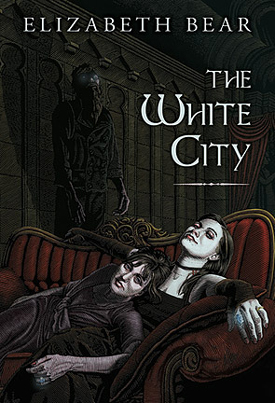 Elizabeth Bear’s The White City is the third installment in her ongoing saga of Sebastien de Ulloa, vampire and wanderer in a universe somewhat different than out own in important respects.
Elizabeth Bear’s The White City is the third installment in her ongoing saga of Sebastien de Ulloa, vampire and wanderer in a universe somewhat different than out own in important respects.
This one is a double-pronged narrative, sandwiching the events related in the first book in the series, New Amsterdam. One prong relates the — well, I can hardly call them “adventures,” but that will have to do — of Sebastien and his courtier Jack Priest in Moscow in 1897, where they move in the city’s artistic — and, people being what they are, radical — circles. One name that keeps cropping up is “Starkad,” who is, it seems, notable by his absence and is also, from all accounts, even older than Sebastien.
The other prong takes place also in Moscow, but in 1903. Sebastien and his courtiers Lady Abigail Irene Garrett, a forensic sorcerer, and Mrs. Phoebe Smith, an author, have come to Moscow to avoid the revolt in Britain’s American colonies and impending war between Britain and France, in the beginnings of which they were unfortunately involved. Perhaps even more, they are fleeing Paris, the scene of Jack’s death. And they find themselves once again caught up in the mystery of Starkad through the agency of Irina Stephanova Belotserkovskaya, a talented artist and once a member of the vanished Starkad’s court.
The stories are built parallel, both involving murders, one brutal and abrupt, one carefully planned out and slow in execution. The victims, however, were not the targets, and the big question for Sebastien and Abby Irene is, who is?
Strangely enough, the narrative here seems somehow flat, uninvolved. Bear may be the victim of her own success: it’s unfair to expect an author to consistently maintain the level she’s achieved in Dust, The Stratford Man, or By the Mountain Bound, and yet we do. And this one doesn’t.
Which is not to say there’s anything wrong with it. I don’t think Bear could write a bad book if she tried. It may simply be a case of a narrative that’s too plainly stated, too distanced, too mundane, without the resonance we’ve come to expect from her. She hasn’t left much for us to do in this one, and letting us, the audience, put together the pieces is a lot of what makes a writer engaging.
Well, not even Shakespeare was perfect.
(Subterranean Press, 2010)
